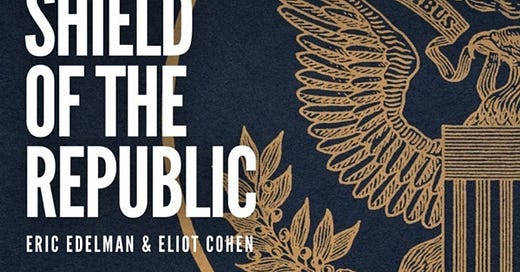Eric and Eliot discuss what they have been writing lately (links below), the situation in Ukraine, the reasons for why Russia analysts got things wrong while military historians got them right, prospects for a renewed Iran nuclear agreement, and whether or not the the United States can handle two near peer adversaries at the same time.
Shield of the Republic is a Bulwark podcast co-sponsored by the Miller Center of Public Affairs at the University of Virginia. Email us with your feedback at shieldoftherepublic@gmail.com.
Links:
Eliot’s Rough Magic Lecture Series (https://www.youtube.com/watch?v=1lfcEzFWztU)
First Makers of Modern Strategy (https://www.amazon.com/Makers-Modern-Strategy-Military-Machiavelli/dp/0691069077)
Second Makers of Modern Strategy (https://www.amazon.com/Makers-Modern-Strategy-Machiavelli-Nuclear/dp/0691027641/ref=sr_1_1?crid=2ALK0J51PARKY&keywords=paret+makers+of+modern+strategy&qid=1662946787&s=books&sprefix=paret+makers+of+modern+strategy%2Cstripbooks%2C58&sr=1-1&ufe=app_do%3Aamzn1.fos.006c50ae-5d4c-4777-9bc0-4513d670b6bc)
The New Makers of Modern Strategy (Including Eric’s Essay) (https://www.amazon.com/New-Makers-Modern-Strategy-Ancient/dp/0691204381/ref=asc_df_0691204381/?tag=hyprod-20&linkCode=df0&hvadid=598250015901&hvpos=&hvnetw=g&hvrand=16909503583947157478&hvpone=&hvptwo=&hvqmt=&hvdev=c&hvdvcmdl=&hvlocint=&hvlocphy=9008163&hvtargid=pla-1720916906283&psc=1)
Eric’s Testimony on JCPOA (https://www.armed-services.senate.gov/imo/media/doc/Edelman_08-04-15.pdf)
Shay Khatiri’s Article on Iran’s Nuclear Weapons Program (https://www.thebulwark.com/irans-nuclear-sites-are-vulnerable-and-iran-cant-deter-an-attack-for-now/)
Eric, Eliot, and Ray Takeyh’s 2016 Essay on Iran (https://www.foreignaffairs.com/articles/iran/2015-12-14/time-get-tough-tehran)
Eliot’s “The Return of Statecraft” (https://www.foreignaffairs.com/articles/world/2022-04-19/return-statecraft)
Eric’s 2010 CSBA Paper on Primacy (https://csbaonline.org/research/publications/understanding-americas-contested-primacy)
Learn more about your ad choices. Visit podcastchoices.com/adchoices














Share this post